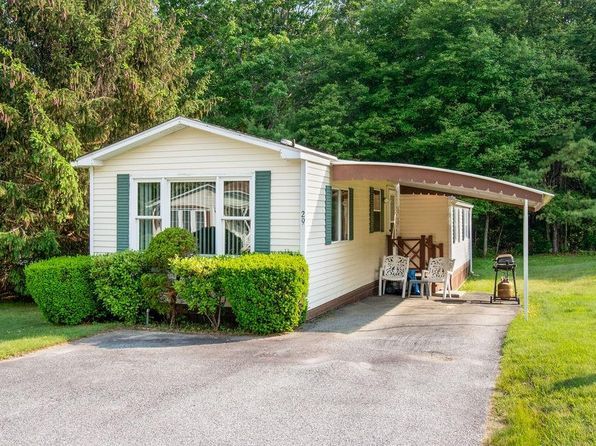Emerging Trends in Rhode Island’s Manufactured Home Industry
Rhode Island’s housing market is evolving, and manufactured homes are becoming a key solution for affordability, sustainability, and innovation. As the Ocean State grapples with rising home prices…
Rhode Island’s housing market is evolving, and manufactured homes are becoming a key solution for affordability, sustainability, and innovation. As the Ocean State grapples with rising home prices, limited new construction, and shifting regulatory landscapes, several notable trends are shaping the local manufactured home sector. Here’s a deep dive into the current developments specific to Rhode Island.
1. Policy Shifts Enhancing Recognition of Manufactured Homes
Recent legislative efforts in Rhode Island have focused on reframing perceptions and providing policy support for manufactured housing:
Counting manufactured homes in affordable housing targets: A bill now enables counting mobile and manufactured homes—as well as federal rental assistance vouchers—toward the state’s Low- and Moderate-Income Housing goals. This marks a crucial shift, formally acknowledging these homes as vital tools for affordability.
Zoning reforms to reduce stigma and enhance access: Rhode Island lawmakers have introduced measures allowing modular and manufactured homes in zones originally reserved for single-family, commercial, or industrial use . These efforts mirror trends in neighboring states, easing onerous restrictions that historically limited deployment.
2. Rise of Resident-Owned Communities
A powerful local movement in Rhode Island is the emergence of resident-owned communities (ROCs), where homeowners collectively purchase the land on which their homes sit:
HousingWorks RI and ROC USA spearhead efforts converting mobile home parks into co-ops, with nearly 5,500 homes across 60 parks now operating under resident ownership browndailyherald.com.
These co-ops empower residents to reinvest in community infrastructure—roads, septic systems, electrical upgrades—and stabilize lot rents manufacturedhomes.com+7browndailyherald.com+7rhodeislandcurrent.com+7.
This model addresses both affordability and equity by giving homeowners control over land assets and reducing vulnerability to redevelopment pressures.
3. Modular Construction Expands Affordable Housing
Rhode Island is also embracing modular construction—a method that builds housing units in factories for on-site assembly:
A pilot multifamily modular housing project in Providence achieved 20% cost savings and 40–50% faster completion than traditional methods browndailyherald.comgolocalprov.com. Local firms like Coastal Modular Homes are actively implementing these builds, with examples in Narragansett and Jamestown golocalprov.com+2coastalmod.com+2coastalmod.com+2.
Statewide proposals to establish a modular fabrication hub at Quonset Point would support scalable production while creating local jobs and reducing long-term costs golocalprov.com.
This trend leverages factory efficiency and Rhode Island’s compact geography to address housing shortages effectively.
4. Affordability Pressure Amid Limited Housing Growth
Rhode Island faces a critical shortage of new housing—ranked last in the U.S. with just a 0.2% increase in housing units in 2024. This shortfall has several key effects:
Escalating home values: Median single-family home prices have surged to roughly $465,000—more than double from a decade ago .
Rental pressure: Inventory is down nearly 70% from pre-pandemic levels, intensifying calls for affordable alternatives like manufactured housing.
In this environment, manufactured homes offer a financially viable route for residents priced out of traditional housing.
5. Sustainable and Tech-Driven Home Features
Homebuyers in Rhode Island increasingly seek energy-efficient and technology-enhanced properties:
Preferences for green materials, solar panels, and smart-home integrations are growing.
Manufactured homes are adapting with eco-friendly designs: better insulation, rooftop solar, and IoT-capable appliances—mirroring mainstream sustainable trends .
As environmental consciousness rises, these enhanced manufactured homes meet modern standards and lifestyle expectations.
6. Smaller, Multi-Functional Housing Footprints
Shifting demographic and economic factors are pushing housing toward compact, flexible designs:
Rhode Island is seeing growth in small homes, accessory dwelling units (ADUs), and multi-functional dwellings designed for affordability and efficiency.
Manufactured homes—especially single-wides, modular ADUs, and compact double-wides—fit naturally into this niche, offering fully functional living spaces on smaller plots whether in parks or interspersed within neighborhoods.
7. Infrastructure Investment Needs
Despite their potential, many parks in Rhode Island contend with outdated utilities and amenities:
HousingWorks RI has highlighted deteriorating roadways, septic systems, plumbing, and electrical infrastructure within existing manufactured home parks.
The ROC movement, supported by state and federal programs, is actively raising capital for resident-driven infrastructure improvements—paving a path to long-term park resilience .
8. Climate Resilience and Regulatory Innovation
Rhode Island’s coastal geography and climate vulnerability have prompted forward-thinking regulatory approaches:
State funding from a $120 million housing bond and wetlands zoning reforms supports ADUs and smaller housing types apnews.com.
Recognition of manufactured housing’s capacity for disaster resiliency is growing—as strong builds, efficient design, and controlled factory construction become more common .
Final Perspective
The manufactured and modular home sector in Rhode Island is clearly evolving—from its role as a fringe supplement to becoming a core affordable, sustainable, and adaptable housing solution.
Key trends include:
Legislative recognition under affordable housing laws
Growth of resident-owned communities to empower park residents
Modular factory construction lowering costs and timelines
Emphasis on sustainable features and smart designs
Rising focus on compact, multi-functional housing footprints
Heavy investment needs for infrastructure
Regulatory shifts improving land-use flexibility
For Rhode Islanders seeking affordability, innovation, or tight-knit community environments, manufactured and modular homes increasingly represent a practical and desirable solution. Policymakers, developers, and community advocates aligned with these trends will be best positioned to address the state’s housing crisis—building not just homes, but accessible, resilient living for all.
These trends signal that Rhode Island’s manufactured home industry is transitioning into a mature sector capable of delivering on promises of cost-efficiency, sustainability, and inclusive ownership. By monitoring and supporting these developments, stakeholders across Rhode Island can ensure mobile, modular, and manufactured homes become integral parts of the state’s housing future.


